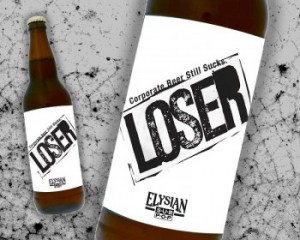Aside from the actual game itself, this past super-bowl weekend carried with it an interesting development in a non-football related field that is quite close to my heart: beer.
Budweiser aired this commercial during the game, to the annoyance of people who apparently like to spend lots of money on beer they don’t drink. Ninkasi, a northwest brewery located in Eugene, immediately shot back with a quite hilarious response video. The point is that for many years now, craft brewers and the big macro brewers like Budweiser and Coors have been increasingly competing for the same market share. While I can understand the annoyance of the craft brewers, I personally think this is an excellent development for a couple of reasons. The first reason is that this ad represents the first concrete evidence that any of the bigger players in the beer industry have a belief that the smaller craft breweries are even in the realm of competition.
The second reason is that in addition to airing this ad, AB InBev; the company that owns Budweiser (and pretty much every other beer as well) just acquired the very popular Seattle-based craft brewery ‘Elysian.’ In addition to the endless jokes that ‘Loser’ is ostensibly now being sold by AB InBev, this shows that the macro-breweries also believe that there is some real value to the ‘quality’ of beer outside of how pretty its label is.

I say this because up until recently, the macro-breweries approach to defeating craft brewers has been to create fake breweries with pretty labels that sold repackaged AB-InBev beer. This is a good change, because even if AB-InBev is able to snuff out the competing micro-breweries in the US, the larger firms are now buying smaller firms so that AB-InBev and their ilk can provide beer at multiple quality levels. This is a good thing because it represents a shift that will benefit the market as a whole, and helps fix what seems to be a long-standing market imbalance towards a lower quality good.
It’s well known that monopolies will always provide a sub-optimal level of goods to any given market, but a monopoly’s choice of quality isn’t so clear. Rather than provide goods of lower or higher quality than a non-monopoly, monopolists will realistically provide either too high quality, too low quality or occasionally optimal quality of goods, depending on how much the market is willing to pay for that quality. For a monopoly, all that matters is whether or not the cost to provide the extra quality will be offset by the amount that the price can be increased for that quality.
Think about it like this: the only pen manufacturer in the world can make either gold plated pens, or pens made of paper that explode after 10 seconds. Obviously, for most people, the gold plated pens are probably a higher quality pen than they need, and so some may end up over-paying for that pen when they’d be just as happy (or nearly as happy) as if they had a bic. On the other hand, some people may really want something that’s as good as a bic, but since the only pen available is an exploding paper-pen, they may be forced to buy a product which makes them considerably less happy than if they could get that bic, even though they’d end up paying more money for it.
All of this is exciting because it means that the beer industry overall is changing in a big way. In a market that is differentiated by quality, new entrants to the market will force the monopolist to adjust its quality level over time, eventually reaching a point where the market is supplying an optimal level (or set of levels) of quality, maximizing the happiness of those participating in that market. Clearly, the larger brewers are trying to play catch up with the upstart craft brewers, and I honestly hope they do so I can have even more beers to sniff through my comically large mustache.
